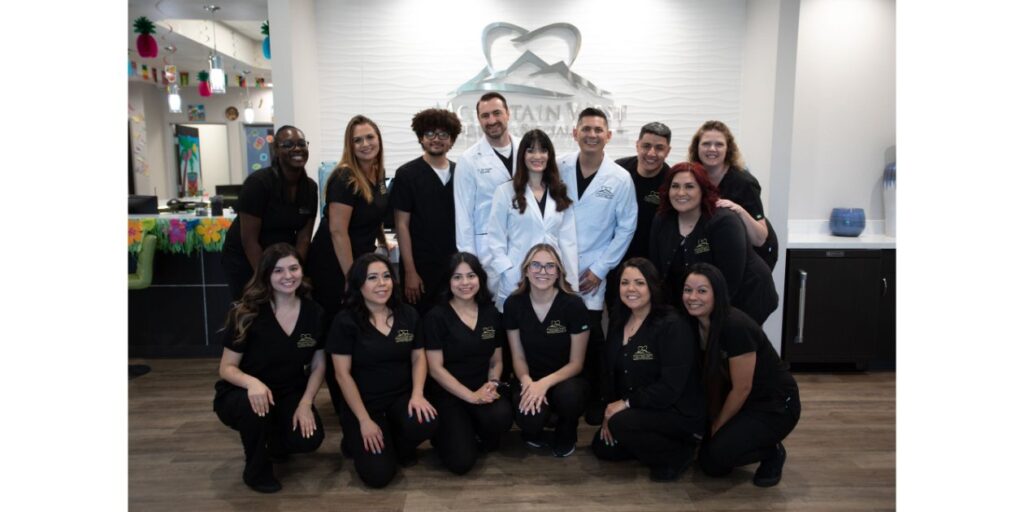Tooth extraction: a term that might conjure up thoughts of last resort and final options. Yet, at Mountain West Dental, Dr. Keaton Tomlin and Dr. Allison Tomlin approach this aspect of dental care with a blend of expert skill and compassionate insight. By shedding light on the various reasons behind tooth extractions, they aim to transform apprehension into understanding. Let’s begin a clear-eyed exploration of tooth extraction, beginning with its fundamental role in preserving oral health.
What is Tooth Extraction?
Tooth extraction, the process of removing a tooth from its dental socket, is often seen as a procedure of last resort in the realm of dental care.
At Mountain West Dental, Dr. Keaton Tomlin and Dr. Allison Tomlin uphold a conservative approach, prioritizing treatments that preserve natural teeth whenever possible. They view extraction not as a routine solution but as a strategic choice made to protect a patient’s overall oral health when other options are either exhausted or impractical. This careful consideration ensures that every extraction performed is with the patient’s long-term wellness in mind, reinforcing the practice’s commitment to thoughtful, patient-centered care.
Moving forward, we’ll jump into preventive measures and daily habits that can help you avoid the need for tooth extraction.
How to Avoid Tooth Extraction: Preventive Measures
Preventing tooth extraction starts with a proactive approach to dental health, a philosophy embraced by Mountain West Dental. Here’s how you can minimize the likelihood of needing an extraction:
- Regular Dental Check-ups and Cleanings: Frequent visits to Mountain West Dental for check-ups and professional cleanings play a pivotal role in catching and addressing potential dental issues before they escalate to the point of requiring extraction.
- Daily Oral Hygiene Practices: The foundation of oral health lies in daily care. Brushing twice a day, flossing regularly, and incorporating mouthwash into your routine work together to remove plaque, prevent decay, and ward off gum disease.
- A Balanced Diet for Oral Health: What you eat significantly impacts your dental well-being. A diet rich in fruits, vegetables, and calcium strengthens teeth from the inside out, reducing the risk of decay and gum disease that could lead to extractions.
With a solid foundation in preventive measures to protect our oral health, let’s now explore specific scenarios requiring intervention, such as when overcrowding requires tooth extraction to pave the way for successful orthodontic treatment.
Overcrowding and Orthodontic Preparation
Achieving a perfect smile sometimes means making space where there isn’t enough. Dr. Keaton Tomlin and Dr. Allison Tomlin at Mountain West Dental often address the challenge of overcrowding with strategic tooth extraction, a critical step towards successful orthodontic treatment. Here’s why and how this approach makes a difference:
- Space Creation: Tooth extraction can provide the much-needed space for the remaining teeth to align properly, addressing overcrowding directly.
- Enhanced Effectiveness of Orthodontic Treatment: With extra space, braces or aligners can work more efficiently, moving teeth into their ideal positions for a straighter smile.
- Prevents Further Complications: By alleviating overcrowding, we reduce the risk of dental issues that can arise from misaligned teeth, such as difficulty cleaning, cavities, and gum disease.
Strategically removing teeth as part of an orthodontic plan sets the stage for a healthier, more functional, and aesthetically pleasing smile. Let’s now shift our focus to another critical reason for tooth extraction: the battle against infection and decay.

Infection and Decay: A Closer Look
Severe decay or an infection deep within a tooth can pose a significant threat to not just the affected tooth but to your overall oral health. Here’s a breakdown of why extraction sometimes becomes necessary:
- Beyond Repair: When decay extends into the pulp or root of the tooth, and a root canal is not feasible or fails to resolve the issue, extraction becomes a safeguard against the spread of infection.
- Preserving Oral Health: Removing a severely infected tooth can prevent the spread of infection to adjacent teeth and the surrounding bone, protecting your overall oral wellness.
- A Pain-Free Solution: Though the idea of extraction can be daunting, modern techniques and anesthesia make it a pain-managed procedure focused on relieving symptoms of decay and infection.
Understanding the pivotal role of extraction in combating severe decay and infection sets the stage for discussing another common dental dilemma: periodontal disease. Next, we’ll explore how gum health plays a crucial role in the integrity of our teeth and when it necessitates extraction.
Periodontal Disease: When Gums Compromise Teeth
Periodontal disease, also known as gum disease, presents a silent threat that can escalate into a major concern for your teeth and their supporting structures. Dr. Keaton Tomlin and Dr. Allison Tomlin at Mountain West Dental emphasize the importance of proactively addressing gum health. Here’s how periodontal disease can lead to tooth extraction:
- Loosening Teeth: Advanced gum disease can destroy the supporting bone and tissues around teeth, leading to loosening and eventual tooth loss.
- Preventing Further Damage: In some cases, extracting a severely affected tooth can prevent the disease from spreading to neighboring teeth and jawbone.
- Comprehensive Treatment Approach: Extraction is considered alongside other periodontal treatments to manage the disease effectively and maintain as much of the natural dentition as possible.
The battle against periodontal disease underscores the necessity of timely interventions. Let’s take a final look at additional reasons for tooth extraction.
Additional Reasons for Tooth Extraction
Beyond overcrowding, decay, and periodontal disease, tooth extractions sometimes address other issues:
- Impacted Teeth: Particularly common with wisdom teeth, impaction can lead to pain, infection, and crowding.
- Orthodontic Treatment Needs: To achieve the best results from braces, strategic extractions may be necessary for alignment.
- Fractured Teeth: Teeth severely damaged below the gum line may require removal if they cannot be restored.
Mountain West Dental, under Drs. Keaton and Allison Tomlin ensure each extraction decision is made with comprehensive care, aiming for the patient’s long-term oral health and comfort.

A Brighter Horizon for Your Smile
Tooth extractions, while varied in reasons, are always aimed at enhancing your oral health. At Mountain West Dental, Dr. Keaton Tomlin and Dr. Allison Tomlin are committed to guiding you toward the healthiest, happiest smile. Las Vegas residents, let’s talk about your smile—schedule your consultation today!




